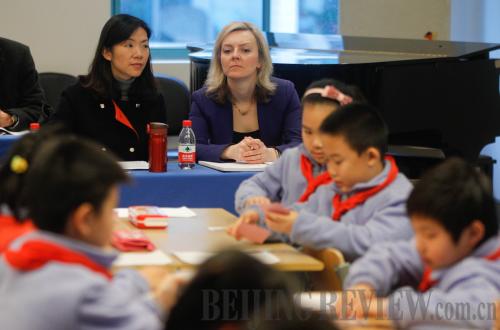|
 |
|
SO I SEE: The UK education minister Liz Truss (center) sits in on a math class at a primary school in Shanghai on February 25 (IC) |
Chinese parenting has a worldwide reputation for placing a heavy emphasis on education, and according to a recent global ranking, the results are unparalleled.
Shanghai, the financial hub of China, took the media spotlight as it secured a No. 1 ranking in mathematics, science and reading in the Program for International Student Assessment (PISA) tests. The 2012 test results were released at the end of 2013 by the Paris-based Organization for Economic Cooperation and Development (OECD). The tests were based on surveys of more than 500,000 15-year-olds in 65 countries and regions. As early as in 2009—Shanghai's first time participating in the PISA—the city scored top marks.
International educational delegations have arrived in Shanghai one after another to learn from the city's experience in secondary education in recent months. For example, a British delegation of head teachers and education experts led by the UK education minister Liz Truss visited Shanghai in late February as part of a fact-finding mission to discover why Chinese students are so far ahead of their British counterparts. She found out that Chinese teachers possess a "can-do attitude to math" which would help drive up standards and give young people the skills to succeed globally.
During her visit in Shanghai, Truss reached an agreement with Chinese education authorities. In the agreement, England will bring in Shanghai math teachers this autumn to raise local performance. Up to 60 Chinese teachers will provide British pupils with master classes.
The UK is one of the leading countries in education, especially at university level. However, when Shanghai topped the PISA test in math, England was ranked just 26th. These low math abilities even follow into adulthood. According to a report by BBC, the UK has launched a campaign to raise adult math skills, with warnings that poor numeracy is costing the UK economy 20 billion pounds ($33.4 billion) per year.
Work hard and score high
An important part of the reason why Chinese students can do well is that they have a strong motivation to succeed, said Chu Zhaohui, a researcher at the National Institute of Education Sciences.
Since the 1980s, Western researchers have argued that China's exam-oriented education would discourage creativity in students. But Chinese students have unexpectedly performed better in many international math contests than their peers in Western countries. These contradictory facts confuse many educational experts. Some say high math scores should be attributed to the Chinese teaching method and curriculum, while other experts believe it is largely due to the high importance that Chinese families attach to children's education.
Gu Lingyuan, a researcher at Shanghai Academy of Educational Sciences (SAES), analyzed the PISA results, noticing that for math, the primary and middle schools in Shanghai break down mathematical concepts in a step-by-step fashion that has proven to be effective. Through a set of well-planned curriculums, math teachers are good at guiding pupils to attain knowledge and advance their level.
China takes a different approach from Western countries when it comes to teaching math, said Gu. Western countries focus on mathematical logics, for instance, while Chinese teachers focus on algorithm and calculation. These two schools of thought have their own features and result in two different teaching methods.
In teaching mathematics, Chinese teachers follow a simple formula: repetition, repetition, repetition. The method is effective at helping pupils to learn, yet it increases the burden of homework as well. According to the PISA report, Shanghai students on average spend 28.2 hours in the classroom per week, ranking ninth in the 65 countries and regions surveyed. But they spend the longest on homework—an average of 13.8 hours every week, almost three times the report average of 4.9 hours. Math homework occupies the bulk of time spent learning outside the classroom.
Furthermore, Chinese schools emphasize classroom discipline. Students tend to follow instructions carefully and behave themselves. It is widely recognized that Chinese students are hard workers, and this high self-discipline helps students concentrate on efficient learning, Gu said.
| 